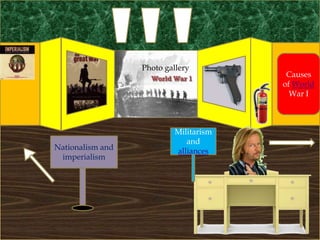
Dan Rooyakkers
- 1. Photo gallery Causes of World War I Militarism and Nationalism and alliances imperialism
- 2. Alliances Trench foot Trench warfare.
- 3. Nationalism- pride in your country Imperialism- competing for colonies Militarism- building up of the military Alliances- forming partnerships with other nations.
- 4. U.S. in WWI and the Treaty of Versailles Exit Why the U.S. entered WWI
- 5. Pan-German movement The hope to unite all German speaking people Pan Slavic movement The hope to unite all Slavic (Russian) speaking people Ex. Bosnia 95% speak Slavic language yet it is controlled by German speaking Austria
- 6. European nation were competing for land. They believed that bigger is better in terms of land. Ex. Africa, Bosnia, Lorraine.
- 8. Military was built up for two reasons. One, to protect their colonies. Two, peer pressure. They used a mandatory draft to accomplish this. Russia had the largest army, Germany the best trained, and Britain had the largest navy but the smallest army.
- 9. Forming partnerships with other nations. Central powers: Germany, Austria, Ottoman empire. Allies: Britain, France, Russia, and the United States.
- 10. Trench warfare was used to protect their positions and to cut down on losses. Both sides of the battle field dug trenches. At night supplies were brought in and scouts were sent out across the battle field. At dawn attacks came. They hit them with artillery. If an enemy solider got to your trench they would have to get through barbed wire and heavy machinegun fire before reaching you. There were many problems in the trenches such as mud, rats, smell, body rot, cold, staying dry, maggots, lice and disease.
- 11. Trench foot was a common problem. Trench foot happened to men who’s feet were in the water at the bottom of the trenches all day long. The men’s feet would eventually start to rot away and become very gruesome.
- 12. exit Treaty of Versailles U.S. in WWI
- 14. 1. Sinking of the Lusitania which was a passenger ship that was secretly carrying ammunitions. A German submarine sunk the ship and 1,198 passengers died and 128 of them were Americans. 2. Unrestricted submarine warfare. The Sussex pledge, Germany promised not to sink merchant ships without first warning them and rescuing passenger. By 1917 Germany is defeating Russia on the eastern front, they wanted a quick victory on the western front. To do this they used unrestricted submarine warfare, sinking all ships headed towards allied nations. 3. Zimmermann note, Zimmermann was a German official. He sent a letter to Mexico asking them to attack the U.S. in exchange he promised that Germany would aid them in retrieving some of the land that we took from them.
- 15. General Pershing led the U.S. troops. By 1917 Germany controlled all of Belgium, Italy, and Northern France. 1918 Russia has a revolution and they drop out of the war. Now Germany can concentrate on the western front. By July 1918 the U.S. have 1 million troops in the war. We cut off the German rail lines which supplied their troops. We attacked through the Argonne forest, it takes us about 47 days and 1.2 million soldiers but we cut of their supplies. By October of 1918 German lines are crumbling, in November the allies have captured the high ground and German surrenders. On the 11th hour of the 11th day of the 11th month in 1918 the treaty is signed and the war ends.
- 16. Created new countries: Russia created Poland, Finland, Latria, Lithuania, and Estonia. Ottoman Empire: divided up between the allies Punished Germany: Germany had to take full responsibility for the war and they also had to pay the 33 billion dollars that the war coast. Created the League of Nation. An organization of countries that was designed to maintain peace and stability.